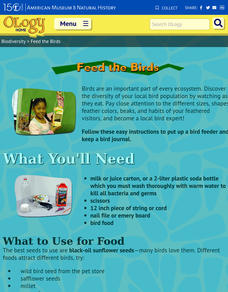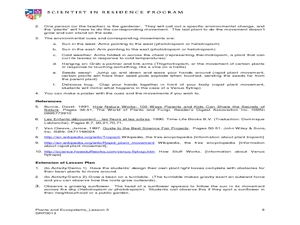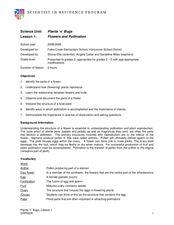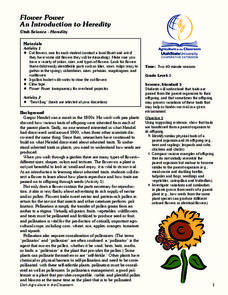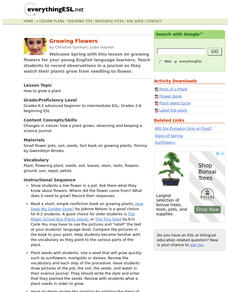Curated OER
Land Issues
In this unit of lessons, students examine land issues affecting the world today. They discover what it is like for animals to live and create paper animals. They also examine parts of a tree and how to make dyes from materials found in...
Curated OER
Growing Learners: A Multi-Disciplinary Approach to Investigating Plants and Flowers
Engage young scientists in these inquiry-based lesson ideas to spring into learning about nature.
Curated OER
Agriculture: Oklahoma's Legacy
Sixth graders explore agriculture as it relates to crops over the course of a series of historical events. They read and create a timeline of the 50-year increments that depict important cause and effect events. Students then use...
Education Outside
Seed Saving
After a discussion of the factors that affect seed germination, class groups harvest and preserve seeds from the school garden.
American Museum of Natural History
Feed the Birds
What kinds of birds are common in the area? Young scientists use household supplies to create bird feeders. They then document the birds that come to their feeders by keeping journals.
American Museum of Natural History
Feed the Birds
Scholars use a large carton, string, an emery board, and bird food to create a hand-made bird feeder. After completing the craft, pupils keep a journal to track their observations.
Curated OER
Bee Pollen Popular
The world would be a much different place without the help of pollinators. Read about the important role bats, hummingbirds, and various insects play in plant reproduction, exploring the interdependence of living things in an ecosystem....
Curated OER
What's Your Genus? Scientific Classification and the VT
Students learn about binomial nomenclature, the scientific system of classification. In this scientific classification lesson, students work cooperatively to complete a binomial scavenger hunt using the internet and a Visual Thesaurus....
Curated OER
What's Your Genus? Scientific Classification and the VT
Students understand the definition of binomial nomenclature. In this binomial nomenclature lesson, students classify ordinary animals by seeking their scientific names. Students participate in a knowledge hunt using binomial nomenclature.
Curated OER
Investigation 9 - Bird Study
Fourth graders examine specific bird characteristics and become more aware of the ecosystems that support each bird. They engage in bird walks, mapping the areas where they find evidence of bird activity.
Curated OER
PALEO COOKIE DIG
Students examine a variety of soil samples and then conduct a simulated "dig" in a grid of no-bake cookie bars.
Curated OER
Plants And Pollination
Students describe sexual reproduction in plants, including the process of pollination, how insects assist in pollination, and how pollination differs from fertilization. They also explore the importance of honey bees to Arizona agriculture.
Curated OER
Plants Alive! How Plants Grow and Move
Young scholars explore how plants move in response to the environment. For this plant lesson, students engage in three different experiments to investigate how plants grow and move. Resources available in English and French.
Curated OER
Designing a Germination Experiment
Students explore botany by participating in a seed experiment. In this plant nutrition instructional activity, students define several science experiment vocabulary terms like observation, treatment, and replicate. Students utilize...
Curated OER
Sun Seeking Plants
Students investigate the story "The Tiny Seed" by Eric Carle. This story is used to introduce the children to the concept that seeds change and grow into plants when conditions in the environment including temperature, light, water and...
Curated OER
Growing Seeds Indoors: What is the difference?
In this dicot and monocot seeds worksheet, students read the difference between the two types of seeds and draw a picture, make a poster, and use the internet to find more research on them. Students complete 3 tasks.
Curated OER
Flowers and Pollination
Learners explore the environment by researching plant reproduction. In this pollination lesson, students define botany related vocabulary terms such as disc flower, petal and fertilization. Learners dissect a flower with their classmates...
Curated OER
Monterey Bay Aquarium: One-Two-Three
For this counting worksheet, students examine pictures of animals that live in the Monterey Bay Aquarium. They describe the animals by telling how many of a specified characteristic they have. Example: A sea otter has one tail.
Curated OER
Inside-out Adaptations
Pupils describe sea stars adaptations and explain how these enable them to survive in different environments. In this animal adaptation lesson students watch a video, get into groups and create a list of characteristics of sea stars.
Curated OER
Fatty Acids
Students draw connections between chemical structures of fats and oils (lipids) and their use in food science and nutrition.
Curated OER
Flower Power: An Introduction to Heredity
Students observe flowers and how they grow according to heredity. In this flowers lesson plan, students observe physical traits that make flowers the offspring of other flowers, and fill out worksheets according to their findings.
Curated OER
Bean There, Done Plant
Students explain that events in nature follow an orderly progression when they plant seeds and observe the development of the seeds. They count seeds and find the likenesses and the differences of many seeds.
Curated OER
Growing Flowers
Learners grow flowers from seeds. They plant quick-growing seeds in a flower pot and consider what a seed needs to grow. They observe and record the growth of the planted seeds in science journals.
Curated OER
Model Penguin Project
Students research and build model penguins. In this penguin lesson, students examine the anatomy of penguins by creating models and completing coloring pages.






